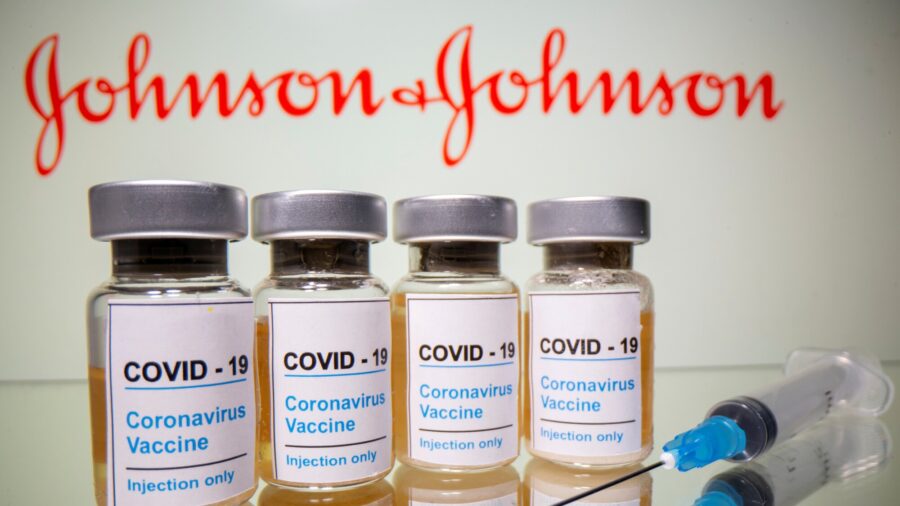The U.S. government on Saturday authorized Johnson & Johnson’s single-dose COVID-19 vaccine, enabling millions more Americans to be vaccinated in the coming weeks and setting it up for additional approvals around the world.
The U.S. Food and Drug Administration announced the emergency use authorization for adults aged 18 and older following Friday’s unanimous endorsement by the agency’s panel of outside experts.
In J&J’s 44,000-person global trial, the adenovirus vector vaccine was found to be 66 percent effective at preventing moderate-to-severe COVID-19 four weeks after inoculation, and 100 percent effective in preventing hospitalization and death due to the virus.
“This is an emergency use authorization to really mitigate hopefully the devastating effects of the current pandemic,” Marion Gruber, the FDA’s director of the office of vaccines research & review, said during Friday’s advisory panel meeting.
There were very few serious side effects reported in the trial, which also offered preliminary evidence that the vaccine reduced asymptomatic infections. If that proves to be the case, it would mean COVID-19 vaccines may indeed reduce virus transmission as well as illness.
J&J’s vaccine is expected to be used widely around the globe because it can be shipped and stored at normal refrigerator temperatures, making distribution easier than for the mRNA Pfizer Inc/BioNTech SE and Moderna Inc. vaccines, which are shipped frozen at ultra low temperatures.
“It potentially could play a very substantial role if we have enough doses because it’s only a single-dose vaccine and that will make it attractive to people who are difficult to reach,” said Dr. William Schaffner, an infectious disease expert at Vanderbilt University Medical Center in Nashville. “It’s one and done.”
Schaffner said the fact that the J&J vaccine can be stored at normal refrigeration temperatures will make it easier to distribute. “We can bring the vaccine to the people,” he said.
The U.S. government, which has purchased 100 million doses of the J&J vaccine, plans to distribute about 3 million to 4 million this week. That would be on top of the around 16 million doses of the Pfizer/BioNTech and Moderna vaccines it already planned to ship across the country.
J&J plans to provide a total of 20 million doses by the end of March, which along with the more than 220 million total doses expected from Pfizer and Moderna would be enough to fully vaccinate 130 million people in the United States.
So far, the United States has distributed more than 90 million doses of COVID-19 vaccines, some of which have been used for second shots. About 14 percent of Americans have received at least one dose, according to U.S. government data.
COVID-19 has claimed more than half a million lives in the United States and states are clamoring for more doses to stem cases, hospitalizations, and deaths.
Public health officials have warned about a rise in the prevalence of more contagious variants of the virus, adding to the urgency to get millions more people vaccinated as quickly as possible. Meanwhile, they said, mask wearing and other measures to curb the virus spread should remain in place as recent declines in COVID-19 cases appear to be leveling off.
The J&J vaccine is also under review by the European Union, where deliveries are expected starting in April and would build on the region’s thin supplies of the Pfizer/BioNTech, Moderna and AstraZeneca Plc shots.
In South Africa, regulators were awaiting the FDA decision as their government looks to deploy more J&J vaccine against a variant of the virus called B.1.351 that is able to evade some vaccine protection.
J&J’s vaccine is being rolled out there prior to official authorization for about 500,000 healthcare workers as it tries to stem infections from the variant, which has swept across the country and spread globally, including to the United States.
The vaccine is one of the few that has been tested in clinical trials against the variant and had a 64 percent efficacy rate at preventing moderate-to-severe disease in South Africa.
J&J said on Friday that the company was developing a second-generation vaccine that would target the concerning South African variant and will be ready to start Phase I trials by this summer.
J&J’s vaccine uses a common cold virus known as adenovirus type 26 to introduce coronavirus proteins into cells in the body and trigger an immune response.
Both the Pfizer and Moderna vaccines, which are based on new messenger RNA technology, showed higher efficacy rates in their pivotal trials when tested using two doses versus J&J’s single-shot vaccine. But experts cautioned against close comparisons because the trials had different goals and J&J’s was conducted while the more contagious new variants of the virus were circulating.
J&J is testing a two-dose version of its vaccine, with results expected this summer.
By Julie Steenhuysen

